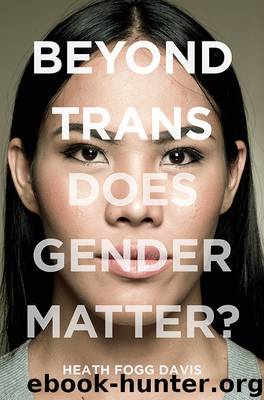Beyond Trans: Does Gender Matter? by Heath Fogg Davis

Author:Heath Fogg Davis
Language: eng
Format: epub
Tags: POL000000 Political Science / General, Gender Studies, Civil Rights, Social Science, Political Science
Publisher: NYU Press
Published: 2017-06-02T00:00:00+00:00
Legal Loopholes
There is also an important legal question to consider. Why in 2016 are some colleges legally permitted to formally exclude prospective students from admission on the basis of sex, while others are not? Why did the negative publicity surrounding Wong’s rejection from Smith not put an end to Smith’s women-only admissions process? The legal answer lies in a special exemption that was written into Title IX. This federal law is best known for its impact on collegiate sports, but it covers all aspects and levels of federally funded educational programming, and includes students, faculty, and staff involved in such programming. Title IX states “that no person in the United States shall, on the basis of sex, be excluded from participation in, be denied the benefits of, or be subjected to discrimination under any educational program or activity receiving Federal financial assistance” (emphasis added).16
At the heart of Title IX is a presumptive ban on single-sex educational institutions because historically most of these institutions excluded girls and women based on both the false stereotype that they were not as smart as men, and the normative stereotype that they should remain in the private sphere of the home. However, the legislation exempts certain kinds of single-sex colleges from this presumptive ban. As Title IX was being debated in Congress in 1972, several elite private women’s colleges such as Smith, along with colleges such as Harvard and Dartmouth, which were male-only at the time, lobbied for and won a special exemption.
The exemption allows private colleges that were founded prior to 1972 and that have “traditionally and continuously” had “a policy of admitting only students of one sex” to maintain their single-sex admissions policies.17 This exemption applies only to undergraduate college programs, so all graduate educational programs at these institutions must be coed. Many private single-sex colleges covered by the exemption voluntarily abandoned their exclusionary admissions policies in the 1960s and 1970s. Religious colleges are exempt from Title IX and may discriminate on the basis of sex.18 This means that religious colleges can also discriminate on the basis of transgender identity.19
Why is any college legally permitted under Title IX to use sex classification in its admissions policies at all? Why must applicants check a male or female sex-identity box on the admissions forms used by all colleges? The quick answer is that no one has questioned the legality of such bureaucratic sorting because, like the other sex-classification policies discussed in this book, it is presumed to be necessary and harmless. One could argue that the Title IX exemption should be overturned on the basis that women-only admissions disadvantage men, and men-only admissions disadvantage women. This would be analogous to cases alleging that the use of race-based affirmative action by colleges disadvantages white and Asian American students.20
The Supreme Court has ruled that race can be used as one of several factors in college admissions, so long as it is not used as the determining factor in such decision making. The Court has stated that race
Download
This site does not store any files on its server. We only index and link to content provided by other sites. Please contact the content providers to delete copyright contents if any and email us, we'll remove relevant links or contents immediately.
| African-American Studies | Asian American Studies |
| Disabled | Ethnic Studies |
| Hispanic American Studies | LGBT |
| Minority Studies | Native American Studies |
Cecilia; Or, Memoirs of an Heiress — Volume 1 by Fanny Burney(31447)
Cecilia; Or, Memoirs of an Heiress — Volume 3 by Fanny Burney(31037)
Cecilia; Or, Memoirs of an Heiress — Volume 2 by Fanny Burney(30985)
The Great Music City by Andrea Baker(23036)
We're Going to Need More Wine by Gabrielle Union(18127)
Bombshells: Glamour Girls of a Lifetime by Sullivan Steve(13158)
Pimp by Iceberg Slim(13000)
All the Missing Girls by Megan Miranda(12841)
Fifty Shades Freed by E L James(12492)
Talking to Strangers by Malcolm Gladwell(11991)
Norse Mythology by Gaiman Neil(11964)
Crazy Rich Asians by Kevin Kwan(8413)
Mindhunter: Inside the FBI's Elite Serial Crime Unit by John E. Douglas & Mark Olshaker(7899)
The Lost Art of Listening by Michael P. Nichols(6534)
Enlightenment Now: The Case for Reason, Science, Humanism, and Progress by Steven Pinker(6449)
Bad Blood by John Carreyrou(5816)
The Four Agreements by Don Miguel Ruiz(5578)
Weapons of Math Destruction by Cathy O'Neil(5097)
We Need to Talk by Celeste Headlee(4922)
